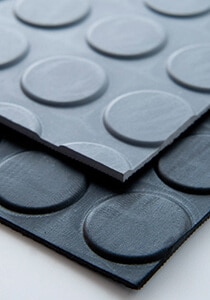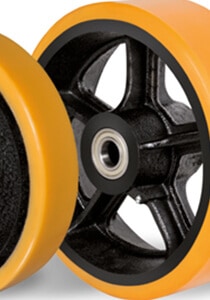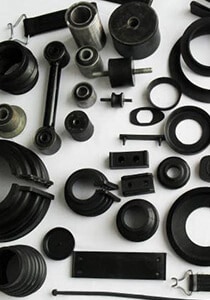Rubber, industrial and technical rubber
We offer industrial rubbers for a wide variety of applications and uses. Our range includes all commonly used industrial rubbers, including FDA-approved rubbers that can be used in the food industry.
We offer both full rolls and precision cut sections, and for most types also custom production of die-cut flat seals (more details here).
We also produce bonded rubber parts (rubber sleeves, couplings, hoppers, etc.) and other rubber products.
We offer the following types of rubbers:
You can find the specific range of materials by clicking on the desired category. If you have any additional questions, please do not hesitate to contact us.

SBR – general purpose rubber
They are intended for general use in places where high demands and requirements are not placed on the material. SBR rubbers are the cheapest option and are used in many applications. Temperature resistance -25 / +70 °C

NBR – oil-resistant rubber
Rubber resistant to mineral and animal oils, fats, petrol and petroleum products in general. Also available in FDA-approved versions (food industry use) Temperature resistance -25 / +70 °C

EPDM – weatherproof rubber
Resistant to weather conditions, aging and also to acids, alkalis and alcohols. Also available in FDA (food industry) and softened (microporous) material Temperature resistance -40 / +120 °C

NR – abrasion-resistant rubber, excellent mechanical properties
Paraguma. Wear-resistant rubber with excellent mechanical properties, strength and elasticity. The use of e.g. for anti-vibration damping elements, for shotguns, etc. Temperature resistance -40 / +85 °C

FPM – rubber resistant to aggressive chemistry, high temperatures
Rubber with excellent chemical and temperature resistance. Resistant to oils, aliphatic, aromatic and chlorinated hydrocarbons, aviation gasoline and other chemicals. Temperature resistance -30 / +250 °C

SILICONE (Si, VMQ, MVQ) – food applications
Non-absorbent and impermeable to water, zero influence on the taste and smell of the medium with which it is in contact. High flexibility at low temperatures, excellent resistance to atmospheric influences and ageing. Temperature resistance -60 / +200 °C

NEOPREN (CR) – ageing resistant rubber
Rubber resistant to aging, weathering, ozone, UV radiation. Also available in FDA-approved versions (for use in the food industry) Temperature resistance -20 / +90 °C

FLOOR RAIN
Rubber for flooring. Anti-slip, anti-vibration, fire-resistant (class M3), electro-insulating and other types. Roll width up to 2000 mm for selected types.

PUR – Polyurethane, excellent mechanical properties
Rubber with excellent mechanical properties, excellent elasticity and abrasion resistance. Possibility of rubberizing parts with polyurethane (e.g. industrial wheels, rollers, pulleys, etc.) Temperature resistance -20 / 80 °C

Rubber and rubber products – possibility of custom production
Possibility to produce specific rubber parts according to customer requirements. Silentblocks, rubber springs, diaphragm seals, rubberized parts, bellows and other products. Piece and serial production.

Other rubber materials – Butyl, Hypalon, recycled rubber
Materials from less frequently used polymers and compounds. Recycled rubber
We usually offer the material in the form of whole rolls, but for the more frequently used types we can also supply precise pieces and sections. For most of these industrial rubbers we also offer the possibility of custom manufacturing of die-cut flat seals or other products according to your requirements. For this purpose, we use cutting and pressing plotters or waterjet cutting technology. We produce bonded rubber parts (rubber sleeves, couplings, hoppers, etc.), hinges, screens and other similar parts.
Further production possibilities in the field of rubber products
We can also arrange the manufacture of custom rubber and rubber products such as silentblocks, bellows and other similar products. We offer polyurethane (PUR) and also rubberization of parts with polyurethane (typically various wheels, pulleys, rollers, etc.)
Our production options also include parts combining metal and rubber. We provide complete production of towing wheels including metal centres, rubberized wheels, atypical silentblocks, rubber springs, rubberized rails and more. We are also able to offer rubber parts made of silicone (VMQ). Possibility of using different mixtures and colours (red-brown, transparent, grey).
We provide the complete production process from the design and recommendation of suitable material, through the production and preparation of the production mould to the actual production and final processing of the product. More information about the production process of custom rubber parts can be found here.
We also perform vulcanization of rubber – production of closed rings, etc. Vulcanization is a chemical reaction in which the molecules of the material are cross-linked, which results in greater elasticity (additional info here)